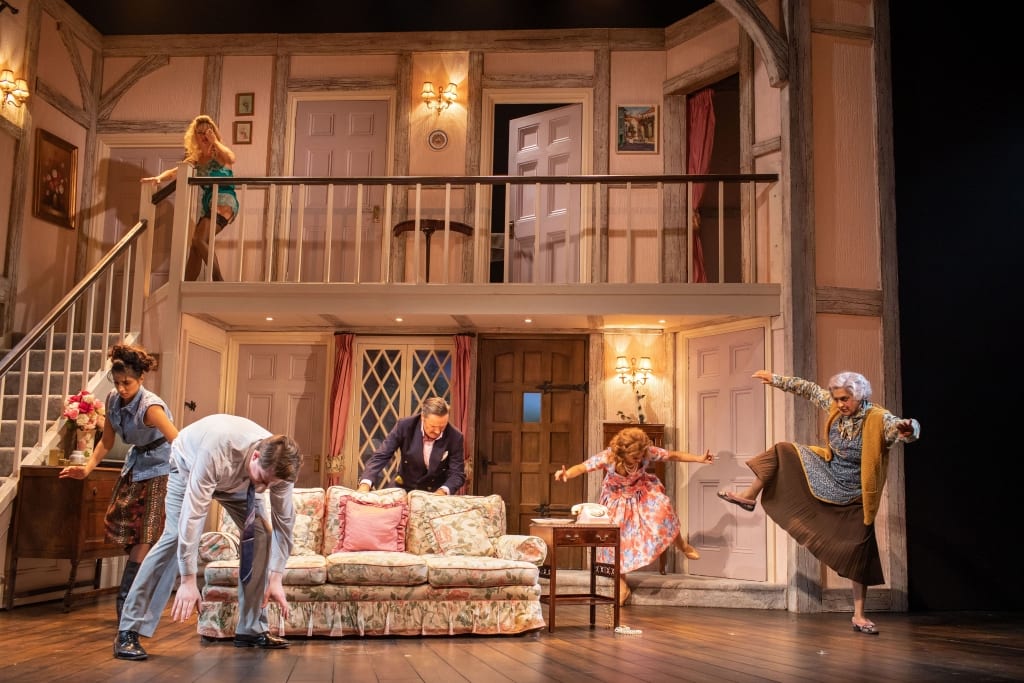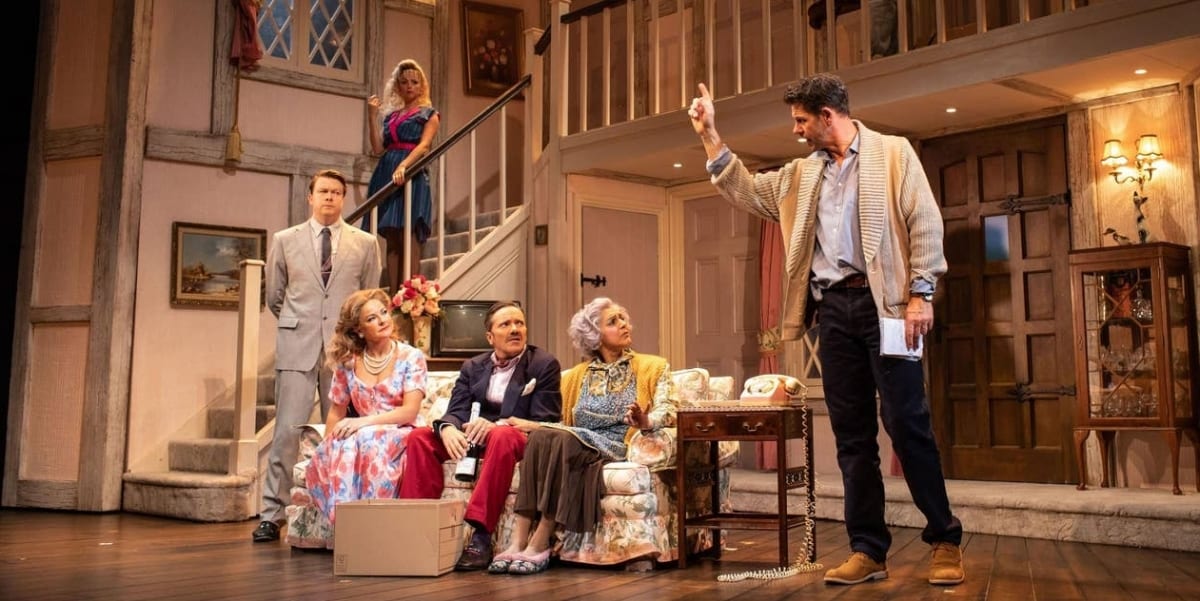‘Noises Off’ was first seen as long ago as 1982, and its many revivals since have ensured that it now enjoys a status not just as a classic farce in its own right but also as one of the most beloved plays there is about the tensions and synergy between what goes on both onstage and backstage, and between the characters and real-life relationships among those playing them. It is above all perhaps an affectionate and knowing tribute to provincial touring repertory theatre – the world of ‘The Good Companions’ – that we have now lost and which was already fading away when it was written.
Each of the three acts is on the face of it a performance of the first act of a traditional creaky bedroom farce, all slap-stick, slamming doors, dropping trousers, blondes in underwear and bizarre coincidences – light, frothy, inconsequential and mainly visual in humour. What is different here is that first act is a fractious late night rehearsal, the second the view from backstage with the set reversed, and the third an increasingly desperate attempt to keep the show on the road as personal relations fray and deliberate sabotage is added to the roster of intended pratfalls. Three different angles, on three different performances.
If this play is to succeed to the extent its famous premiere did (with Paul Eddington, Patricia Routledge and Nicky Henson among others) what is needed is impeccable technical skill together with an ability to sketch out character so that the jealousies and tensions behind the scenes become as real as the action on stage. It was this juxtaposition between the expected humour onstage and the increasingly frantic and fraught action behind the scenes that provided Frayn with the original concept; and for the real pay-offs to happen you need an ever-increasing tension between what you have learned to expect from the original play and the ever-more manic deviations from it that occur as cooperation collapses.

This production only reaches this standard occasionally, alas. The pace is half a beat too slow throughout the first act; and then in the breakneck second act the interplay between the delivery of the play and the prop-filled mime of the backstage antics is diminished by the fact that the delivery of the play lines is not always audible. Sometimes the actors just don’t ride the audience laughter expertly enough to ensure the crucial punchlines are audible – such as in the crucial revelation with which the second act ends. Finally, the characterisation is fairly thin overall so that we neither know nor care very much about the backstories of the actors and therefore the mayhem of the final act is not entirely explicable. One can’t help thinking that the fact that earlier casts grew up in repertory provided the insights to give them the depth of understanding of this aspect of an actor’s life to get the points across with true economy and human warmth. They were inside this play in a way that this cast is not.
There are no complaints about set design (and its intended fragility!), or the costumes, suitably trite music etc.. All these are as they should be and indeed are pretty much set in the terms of the original concept. In this play a special mention should go to the actual props manager so as to ensure that the right object is or not in its (un)intended place in relation to the play-within-a-play.
The nine members of the cast have equal loads to bear – this is an ensemble piece in which everyone is essential to the success of the whole. On press night everyone seemed a bit tentative, and the comic highlights did not cumulate, nor lines detonate, quite as they should. Meera Syal was underpowered as the fading diva seeking to revive her fortunes, and Lloyd Owen lacked the combination of world-weary sarcasm and lecherous narcissism to bring the figure of the obnoxious director to life. Daniel Rigby did not have the swagger needed in the self-appointed leading man, and Lisa McGrillis could have made more of the deadpan textual literalness in her impersonation of the conventional ‘Barbara Windsor’ dumb blonde. In fact some of the best acting came from the less showy members of the cast – Sarah Hadland as the competent, if gossipy pro, Belinda, who is the only one focused on ensuring the show goes on, and Adrian Richards as the long-suffering stage manager, Tim, valiantly struggling to see that doors open and close and bunches of flowers go to the right person.
This play is sufficiently indestructible to be funny enough on any night to win over an audience. But on this press night it significantly failed to match the heights of sustained hilarity and charm achieved in earlier productions whether in this century or the last.

